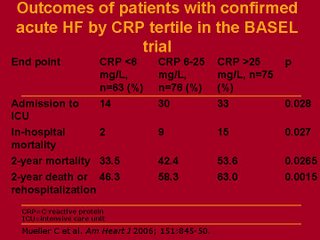Is Heart Failure an Inflammatory Disease?
Dr Christian Mueller and associates from the University of Basel, published a piece of work in the April 2006 issue of the American Heart Journal, entitled "Inflammation and longterm mortality of acute congestive heart failure". This research found that elevated levels of hs-CRP taken in the emergency room predicts the 2 year mortality of the acute heart failure. The elevated hs-CRP also predicts the acute hospital mortality of that admission. The higher the hs-CRP level, the worse the prognosis.
This study raises an important patho-physiological point of whether heart failure is triggered by pro-inflammatory agents. Do pro-inflammatory cytokines trigger acute heart failure and also affect the long-term outcome? In fact there was a previous work in animals which showed that the IV infusion of TNF (tumour necrosis factor) alpha and interleukin 6, caused diastolic heart failure. This further adds to the growing body of evidence that many cardiac disease condition may be inflammatorily mediated. Is IL6 and TNFalpha, the cause of the heart failure, or heart attacks, or the result of the heart failure or heart attacks.
It follows then that ACE-I, ARBs and beta-blockers like carvidelol are anti-inflammatory agents when they act to improve the prognosis of heart failure. There is even some work that "statins" are also helpful in heart failure. Well this certainly throws a whole new approach to heart failure and cardiac disease. There is also work to show that diabetes and hypertension are also inflammatory disease. All these certainly ties in well with our earlier published post that atherosclrosis is may very well be an inflammatory disease.
1 comment:
Yes Heart failure is an inflammatory disease and we can know this by many symptoms.If we are not eating properly and not doing exercise regularly then we can feel very tired and weak and it leads us to heart failure. Being overworked or depressed can make a person tired or give them a general feeling of weakness and even lack of concentration is the sign of HF. There are a few physical signs that may indicate Heart Failure. Fluid retention, which causes weight gain and possible swelling of the feet, ankles, or even abdomen, is associated with the disease. Another physical sign is bulging of the neck veins. These all are sign of heart failure.
<a href="http://www.insideheart.com/></a>
Post a Comment